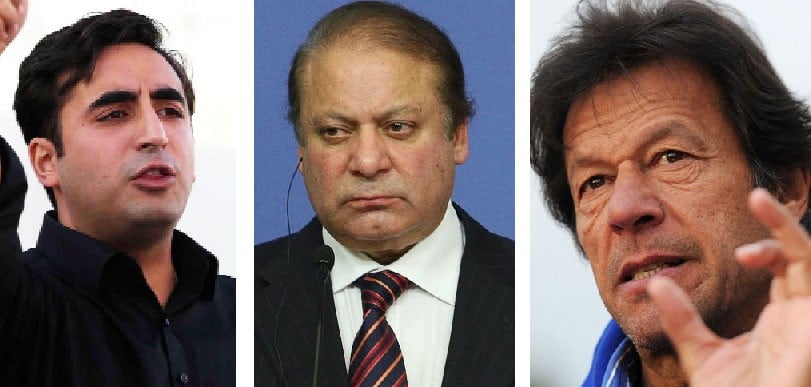
As the opposition and government lock horns on Panama and other issues, tough days await the ruling PML-N

As the mercury falls with each passing day, the political temperature is on the rise in the federal capital. The major opposition parties stand divided on numerous fronts. Critics are of the view that the opposition must build combustible political campaigns soon to brace for the general elections. The ruling Pakistan Muslim League-Nawaz (PML-N) will inevitably be a part of the race.
Within this broad view of politics exist issues and political developments that are likely to change it any which way. The case of Panama Leaks is becoming more curious after the recent developments in the Supreme Court. The return of former President Asif Ali Zardari is being keenly viewed, especially in how it will define the role of Pakistan People’s Party (PPP) as a leading opposition party in the National Assembly as well as in the Senate. The PPP does look more relevant and aggressive after its young chairman has come out hard on the ruling PML-N.
And Imran Khan’s Pakistan Tehreek-e-Insaf (PTI) has finally returned to the parliament, opening up the possibility of joining hands with the PPP, and getting tough on the Sharifs with reference to the Panama Leaks.
In the words of PTI’s chief spokesperson Naeem-ul-Haq, "we are in touch with the PPP and stand united to keep the Panama Leaks’ issue alive. 2017 is the year of Sharifs’ accountability."
Yet, amid this entire political ruckus, Premier Sharif seems to have emerged as a more powerful ruler soon after the extremely ‘popular’ army chief General Raheel Sharif got his superannuation last month. Sharif has successfully managed to appoint a new chief of army staff and chairman joint chief of staff committee, as per his wishes.
Analysts predict that the opposition and the government would continue to lock horns on Panama, methods of conducting census (in March 2017), electoral reforms, National Action Plan, Quetta Inquiry Commission Report and other issues. One thing is obvious that there are tough days ahead for the prime minister.
"2017 will be a politically charged year as parties gear up for general elections. The PPP will announce its course of action on how to force the government to implement its four demands. These demands as repeatedly spelt out by chairman Bilawal pertain to ensuring democratic accountability of corruption in Panama Leaks, accountability of failure in implementation of National Action Plan and implementation of CPEC in accordance with the May, 2015 decision of All Parties Conference," says PPP Senator Farhatullah Babar.
"Above all, this martyrdom anniversary on December 27 has already been declared by the chairman as a watershed event," says Babar.
Analysts are not too convinced about the party’s capability to pull out crowds for street agitations against the ruling PML-N. "I don’t think PPP has the ability yet to cause any big political upheaval," says senior journalist Haroon Rashid, now heading BBC Urdu Service in Islamabad. "The return of Zardari is being seen as a big political development, but he went out on his own will and remained abroad for his own fears. My hunch is that he chose to remain abroad as a precaution rather than a real threat -- after he had lost patience and spoken against the ever powerful military," says Rashid.
He predicts that the ruling party would come under fire with each passing day. "Before the next general elections, each political party would like to push or damage the ruling PML-N as much as possible. Any further delay would have meant loss of precious time needed for party’s re-organisation and boosting the morale of its workers."
The PTI did create commotion by entering the National Assembly where many witnessed the real power of opposition. When the opposition sought a clarification from prime minister on his contradictory statements given on the floor of the House and on the state-run PTV, the Speaker Ayaz Sadiq was forced to prorogue the session abruptly. Analysts think the purpose of the PTI has been served.
"The people of Pakistan need an alternative. The trends indicate the PTI as a hope but you never know people’s choice in democracy," says political commentator Ayaz Amir. "Both the PPP and PML-N, considered to be two big pillars of Pakistani democracy, have apparently been swept by other considerations. No need to recount their exploits which are now part of the national folklore."
Punjab remains to be a major battleground. The PTI continues to struggle to grab more votes in Punjab while the PPP is apparently trying to regain its past glory, especially in South Punjab.
The PML-N faces challenges in many parts of Balochistan and Punjab where governance deficit is more visible. But PML-N MNA Daniyal Aziz claims his party has fulfilled its promises which include mega projects and completion of metro bus projects in Multan and Rawalpindi and Islamabad in particular. "The Panama Leaks has become an old story now. We should move forward now," says Aziz.
As for the PTI, despite its slogan of new Khyber-Pakhtunkhwa, it could not start mega projects or bring the revolution that people were expecting. Some people think the province badly needs foreign investments that have stopped due to worsening law and order in its tribal areas.
Questions also were being posed by many commentators about the PPP’s drift towards political irrelevance in the country.
"The real battle for the PPP in Punjab is against the PTI for both are fighting for same political constituency while the PMLN’s constituency in Punjab is intact," says Adnan Randhava, an Islamabad-based political analyst.